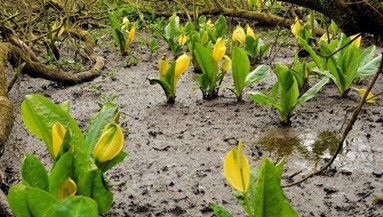
Monday, 27 May 2024
Boleskine Environmental Network initiated a project in 2020 to control skunk cabbage around Loch Mhor.
American skunk cabbage Lysichiton americanus is native to western North America. It is an Invasive Non-Native Species (INNS) in the UK which can establish rapidly in suitable sites and form dense colonies which quickly out-compete our native flora.
Populations are now present in a number of locations scattered across Scotland, having escaped from botanical collections and private gardens and naturalised in the wild, particularly in wet woodlands and boggy areas. Wet woods are a relatively scarce and sensitive habitat which supports a number of rare plants, so the impact on biodiversity can be significant. Unfortunately several skunk cabbage colonies are present around Loch Mhor. Each of these is a fresh nucleus for further expansion, and without control, there is potential for exponential growth in the population. At least three of the sites where it is present hold small numbers of Coralroot Orchid Corallorhiza trifida, a rare plant found in wet sites in north Britain which would likely disappear if skunk cabbage was allowed to spread further.
Initial funding was raised from the Community Council and local landowners to pay an experienced contractor to treat the largest concentrations. Volunteers undertook the surveying and monitoring, and tackled the smaller outlying colonies. There was a noticeable decline in all colonies following the first season’s efforts. Since then control has continued each year and we are seeing fewer and fewer large plants at the known colonies. However, each colony will have a large seedbank and as seeds can remain dormant for many years, we will need to keep monitoring and removing small seedlings over the next few years until the seedbank is depleted and no more seedlings appear.
For the control work to be effective, we need to make sure we have found and removed every skunk cabbage colony present, otherwise when control stops the plants will start to spread again. Please do get in touch (alison.phillip3@gmail.com) if you are aware of any skunk cabbage colonies or if you would like to help us stop its spread around our community.
Thanks go to the local landowners who have provided support/funding and enabled access to control colonies around the loch and to the community council for funding.
To find out more about what the Biodiversity Group are doing then head over to the dedicated Biodiversity page HERE!
- 2026
- February (10 stories)
-
17 February
Send us your Spring photos
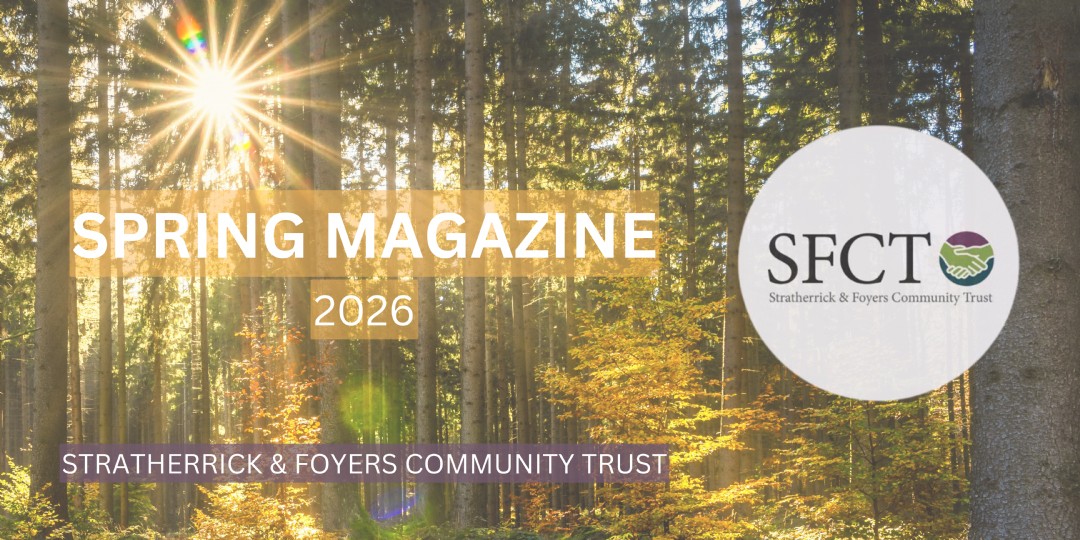 🌸 We’re welcoming spring! 🌸 Our Spring Magazine is on the way, and we’re inviting the community to share your favourite spring-themed photos an...
🌸 We’re welcoming spring! 🌸 Our Spring Magazine is on the way, and we’re inviting the community to share your favourite spring-themed photos an... -
17 February
What a match!
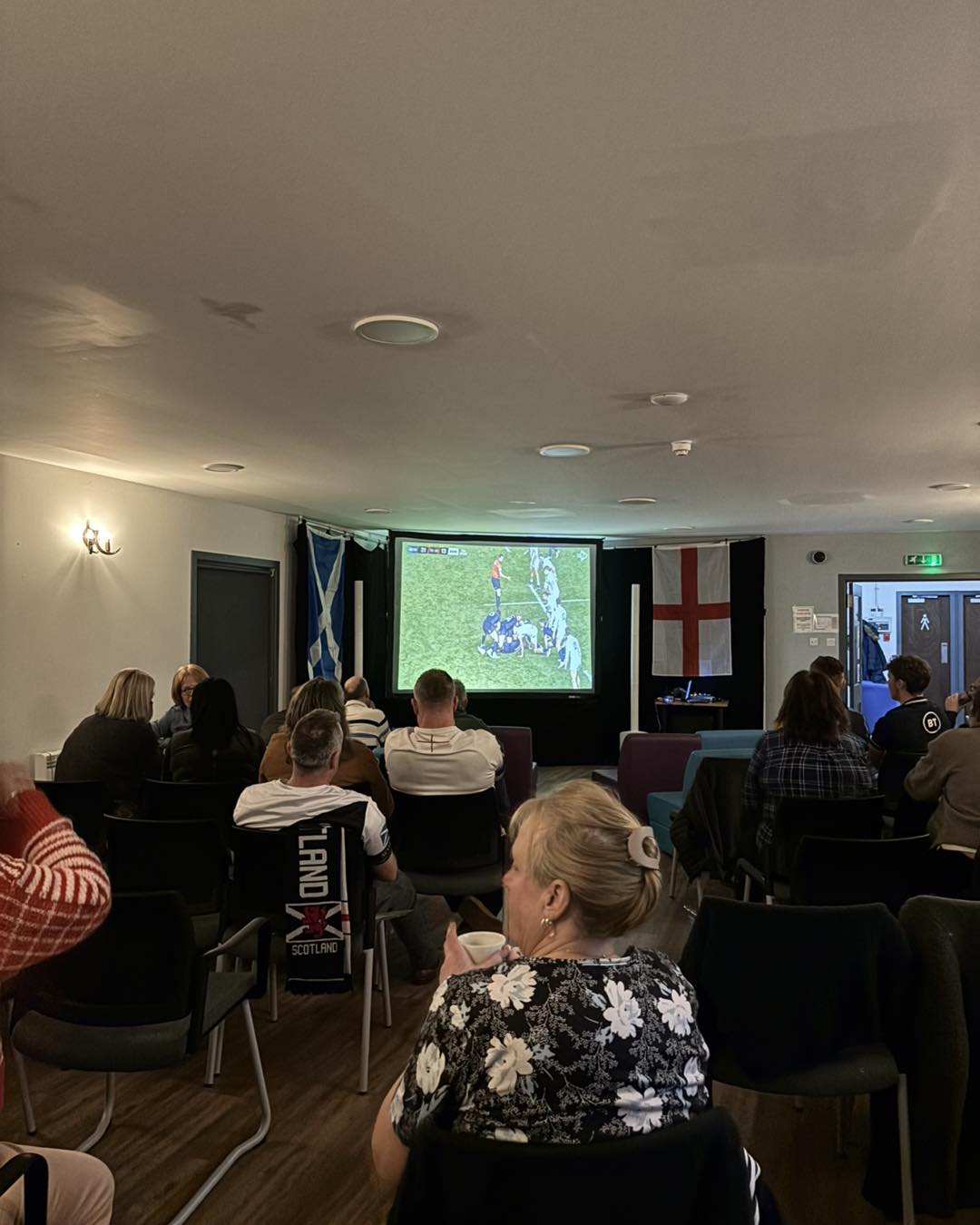 Thanks to those of you who came down to The Wildside to watch the Scotland v England game! What an atmosphere. What do you want to see next? Please sha...
Thanks to those of you who came down to The Wildside to watch the Scotland v England game! What an atmosphere. What do you want to see next? Please sha... -
12 February
📢 Calling Local Employers!
 We’re considering hosting a local Jobs Fayre at The Wildside Centre in early March and would love for you to get involved. If you’re currently re...
We’re considering hosting a local Jobs Fayre at The Wildside Centre in early March and would love for you to get involved. If you’re currently re... -
10 February
Join our Events Committee
 Do you love events? Are you organised, creative, or full of ideas for bringing people together? Would you like to help shape what happens in our community throughou...
Do you love events? Are you organised, creative, or full of ideas for bringing people together? Would you like to help shape what happens in our community throughou... -
10 February
🚐 Community Minibus Service is Back!
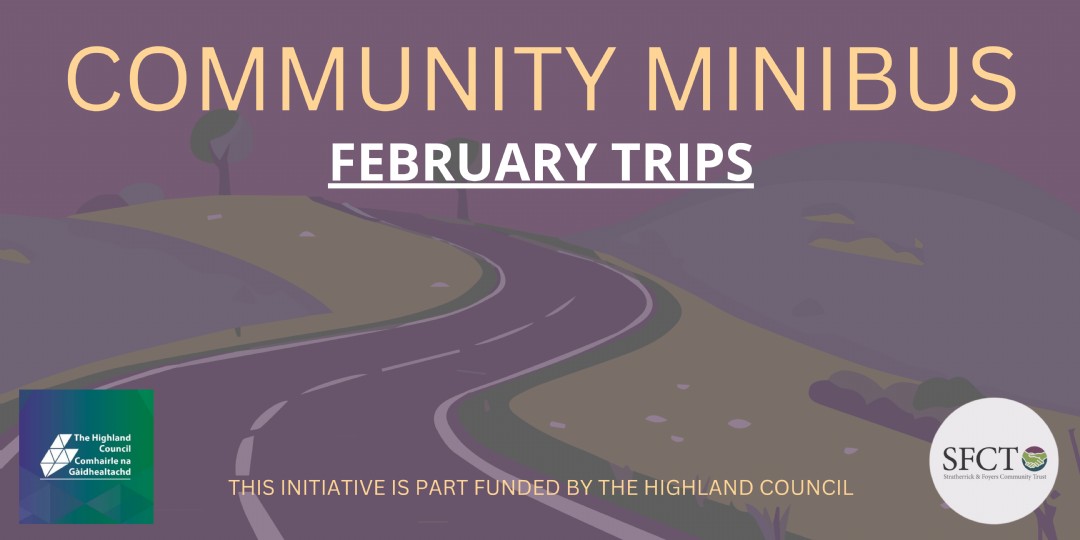 Great news! Our community minibus service is back as of February 🎉 We’ve got a lovely selection of trips lined up for this month, check them out below 👇 &nb...
Great news! Our community minibus service is back as of February 🎉 We’ve got a lovely selection of trips lined up for this month, check them out below 👇 &nb... -
6 February
🌼 Let Your Words Bloom This Spring 🌼
 We are starting to pull together our 2026 Spring Magazine Special, to help do this, we are now looking for fantastic articles to feature! Do you have a story...
We are starting to pull together our 2026 Spring Magazine Special, to help do this, we are now looking for fantastic articles to feature! Do you have a story... -
5 February
Urgent update regarding the Foyers Stores acquisition
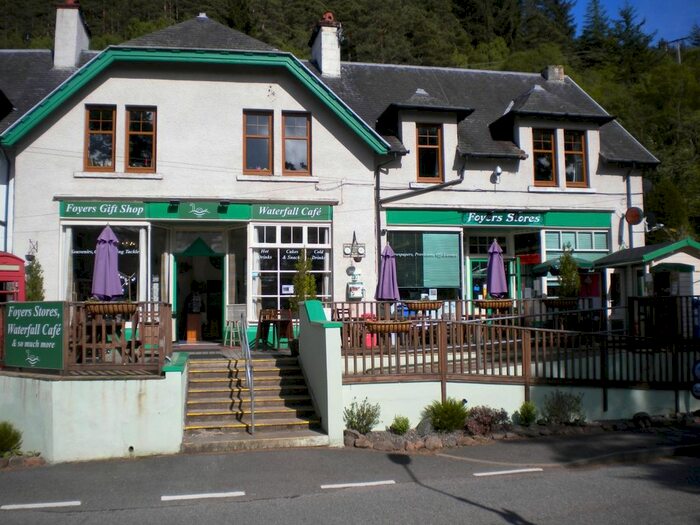 We are delighted to confirm that following SSE’s approval of the Stratherrick and Foyers Community Trust Board’s recommendation we have approved the grant app...
We are delighted to confirm that following SSE’s approval of the Stratherrick and Foyers Community Trust Board’s recommendation we have approved the grant app... -
4 February
📣 Noticeboard Update!
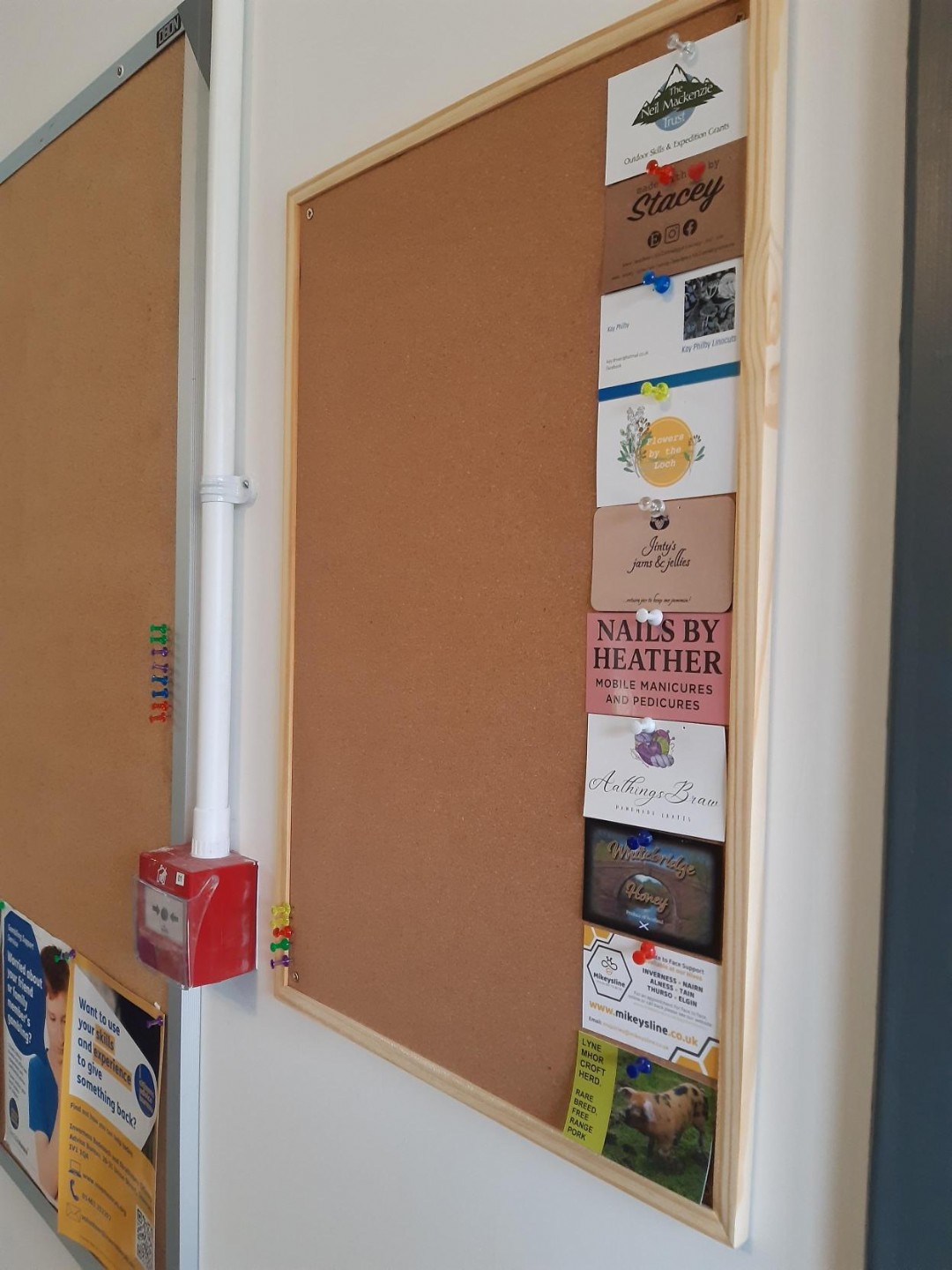 We have recently moved our noticeboard to the reception area within the Wildside Centre! Business cards now have their own dedicated board. If you run a local business...
We have recently moved our noticeboard to the reception area within the Wildside Centre! Business cards now have their own dedicated board. If you run a local business... -
3 February
📚 Mobile Library Visiting Tomorrow! 🚐✨
 The Mobile Library is rolling into the area tomorrow, Wednesday 4th February, so pop along and say hello to Mark! Stop & time: • The Wildside Centre &ndash...
The Mobile Library is rolling into the area tomorrow, Wednesday 4th February, so pop along and say hello to Mark! Stop & time: • The Wildside Centre &ndash... -
3 February
RSABI Fundraising Event
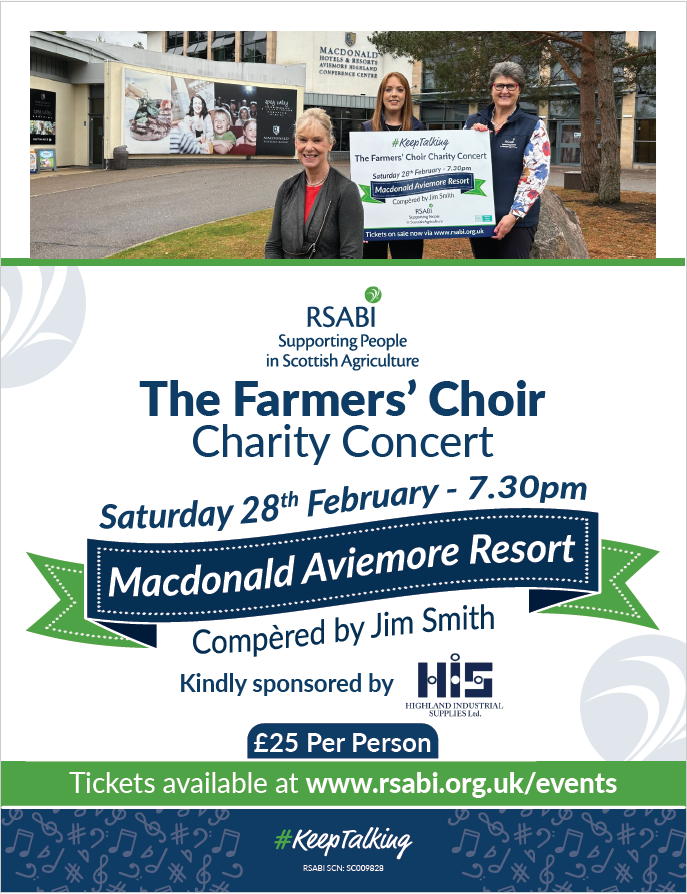 Don't miss out on an incredible evening of music and laughter with the talented Farmers Choir performing in Aviemore late February in aid of RSABI and SAYFC. ...
Don't miss out on an incredible evening of music and laughter with the talented Farmers Choir performing in Aviemore late February in aid of RSABI and SAYFC. ... - January (12 stories)
-
28 January
Six Nations: Scotland 🆚 England LIVE at The Wildside
 💘 This Valentine’s Day, find someone who loves you as much as you love rugby 🏉 We’re streaming Six Nations: Scotland 🆚 England LIVE at The Wil...
💘 This Valentine’s Day, find someone who loves you as much as you love rugby 🏉 We’re streaming Six Nations: Scotland 🆚 England LIVE at The Wil... -
27 January
🌳 Development of Inverfarigaig Forest School 🌳
.jpg) A community member has been in touch about the possibility of setting up a Forest School within our community. With the support of the Community Trust, a short survey has...
A community member has been in touch about the possibility of setting up a Forest School within our community. With the support of the Community Trust, a short survey has... -
26 January
📚 Mobile Library Visiting Tomorrow! 🚐✨
 The Mobile Library will be in the area tomorrow, Wednesday 27th January, so pop along and say hello to Mark! 📍 Stopping points & times: • Errogi...
The Mobile Library will be in the area tomorrow, Wednesday 27th January, so pop along and say hello to Mark! 📍 Stopping points & times: • Errogi... -
22 January
🔥 Free Firewood Available – Whitebridge Area 🔥
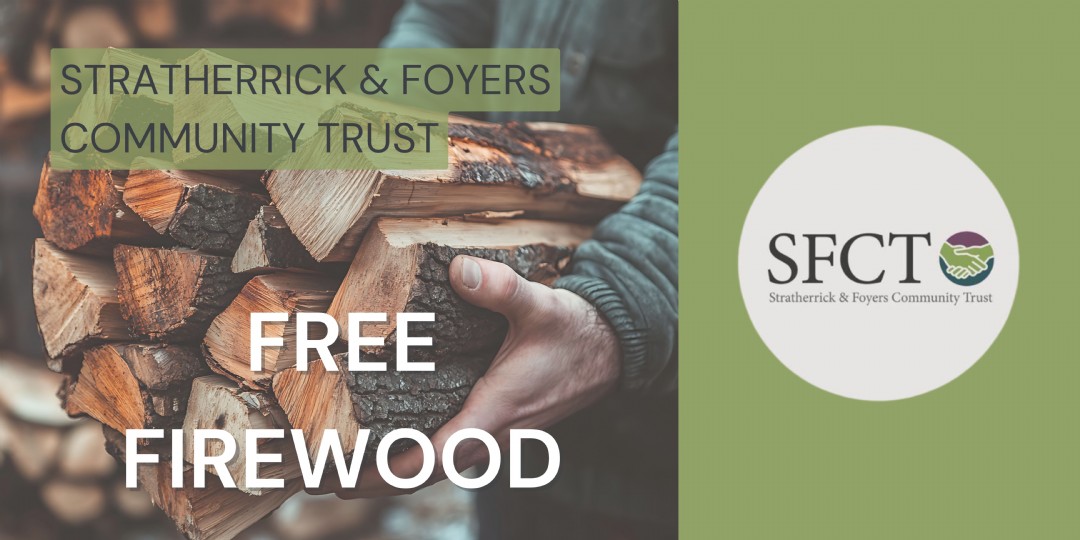 A member of our local community, has been in touch with Stratherrick & Foyers Community Trust (SFCT) to let us know that he has a significant amount of larch firewood...
A member of our local community, has been in touch with Stratherrick & Foyers Community Trust (SFCT) to let us know that he has a significant amount of larch firewood... -
21 January
Large grant application from BCC for Foyers Stores Acquisition - Update
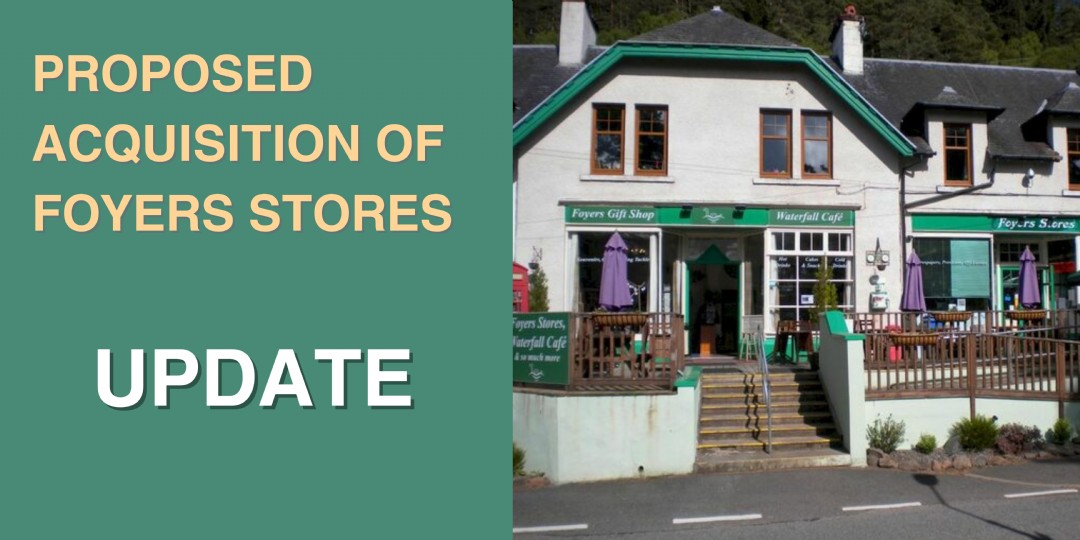 A Board meeting is taking place this evening in order for Directors of SFCT to consider the application and agree their recommendation. As the Chair of SFCT explained at ...
A Board meeting is taking place this evening in order for Directors of SFCT to consider the application and agree their recommendation. As the Chair of SFCT explained at ... -
20 January
Thank you!
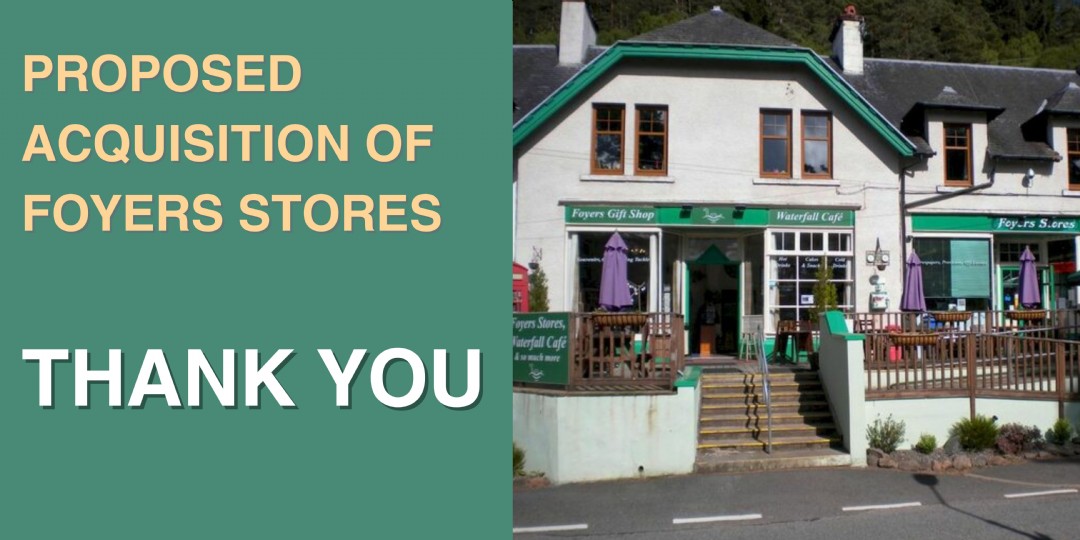 Thank you to everyone who came along to the public meeting at the Wildside last night. We had a fantastic turnout, with 110 people attending in person and 26 joining u...
Thank you to everyone who came along to the public meeting at the Wildside last night. We had a fantastic turnout, with 110 people attending in person and 26 joining u... -
19 January
Agenda for Public Meeting - Regarding the Foyers Stores Acquisition
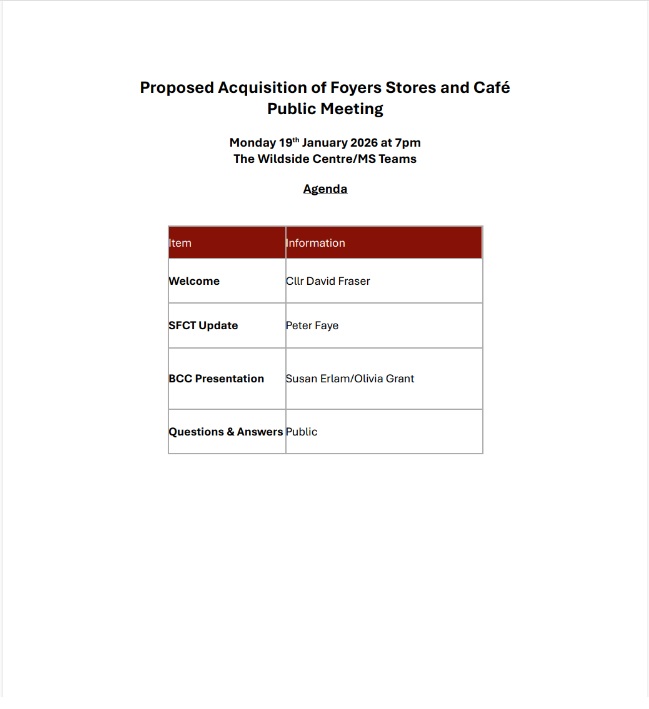 Please find the agenda for tonight’s public meeting at the Wildside Centre regarding the proposed community acquisition of Foyers Stores. 1. Welcome &n...
Please find the agenda for tonight’s public meeting at the Wildside Centre regarding the proposed community acquisition of Foyers Stores. 1. Welcome &n... -
14 January
Apply for our Project Coordinator role
 👋 Friendly reminder! There’s still time to apply for our Project Coordinator role at Stratherrick and Foyers Community Trust ...
👋 Friendly reminder! There’s still time to apply for our Project Coordinator role at Stratherrick and Foyers Community Trust ... -
8 January
Notice to the Community: Change of Date for Public Meeting on Foyers Stores
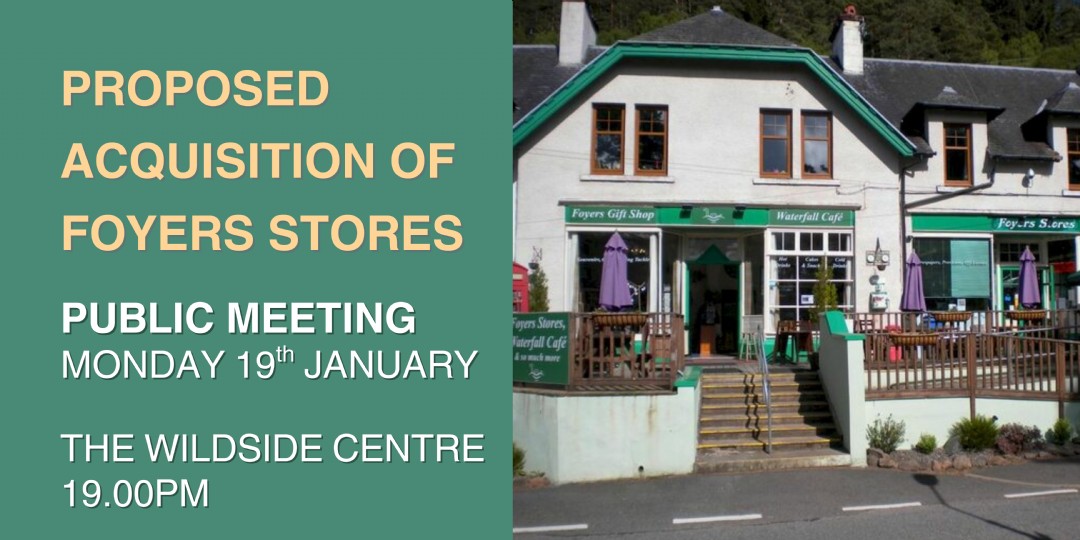 Stratherrick and Foyers Community Trust (SFCT) would like to update the community regarding the previously announced public meeting relating to the proposed purchase of F...
Stratherrick and Foyers Community Trust (SFCT) would like to update the community regarding the previously announced public meeting relating to the proposed purchase of F... -
7 January
🌟 New Year, New Opportunities! 🌟
 Stratherrick & Foyers Community Trust is here to support your projects with our grants! 💡✨ 📅 Next application deadline: 21st March 2026 Learn more about ...
Stratherrick & Foyers Community Trust is here to support your projects with our grants! 💡✨ 📅 Next application deadline: 21st March 2026 Learn more about ... -
6 January
🎉 Calling all community organisers! 🎉
 Do you run a class, group or one-off activity in one of the local buildings? We’d love to help spread the word! 💛 Our SFCT Community Calendar is looking a ...
Do you run a class, group or one-off activity in one of the local buildings? We’d love to help spread the word! 💛 Our SFCT Community Calendar is looking a ... -
6 January
Mobile Library Visit Cancelled – Wednesday 7th January 2026
 👋 Hello and welcome to 2026 from SFCT! 🎉 We bring news from the Mobile Library as our first update of the year. 📚 Mobile Library Visit Cancelled – Wednesday ...
👋 Hello and welcome to 2026 from SFCT! 🎉 We bring news from the Mobile Library as our first update of the year. 📚 Mobile Library Visit Cancelled – Wednesday ...

 Stratherrick & Foyers Community Trust,
Stratherrick & Foyers Community Trust,